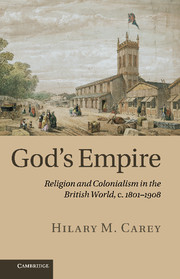Book contents
- Frontmatter
- Contents
- List of figures
- List of maps
- List of tables
- Preface and acknowledgments
- List of abbreviations
- Maps
- Part I God's empire
- Part II Colonial missionary societies
- Part III Colonial clergy
- Part IV Promised lands
- Introduction: emigrants and colonists
- 11 Christian colonisation and its critics
- 12 Colonies
- Conclusion
- Bibliography
- Index
- References
Introduction: emigrants and colonists
Published online by Cambridge University Press: 04 February 2011
- Frontmatter
- Contents
- List of figures
- List of maps
- List of tables
- Preface and acknowledgments
- List of abbreviations
- Maps
- Part I God's empire
- Part II Colonial missionary societies
- Part III Colonial clergy
- Part IV Promised lands
- Introduction: emigrants and colonists
- 11 Christian colonisation and its critics
- 12 Colonies
- Conclusion
- Bibliography
- Index
- References
Summary
Throughout the nineteenth century, the attitude of the churches to emigration and colonisation remained ambivalent. For those who saw emigration as inevitable, or even Providential, it was necessary for the Church to provide some guidance and protection to those who were leaving British shores. The Catholic and Presbyterian churches had the most pragmatic attitude towards this and had been supplying emigrant services for the Irish and Scottish diasporas since the outpourings of the 1830s. However, even in Ireland, the clerical hierarchy was conflicted about the extent to which emigration was a boon or a hindrance to the church and nation. In response to a government inquiry on emigration, the bishop of Clonfert, when asked if he opposed emigration, responded ‘I am, and I am not. I am opposed to emigration for the sake of the general welfare of the country … But in another sense, for the individual himself, who leaves the country and takes his youth and strength to America, it may be a blessing.’ Most clergy were concerned that the duty of caring for emigrants and settlers should not impinge on the churches at home, which were already struggling to minister to the urban poor. Emigration was open to moral critique if it was seen to be motivated purely by the lure of material, rather than spiritual advancement.
- Type
- Chapter
- Information
- God's EmpireReligion and Colonialism in the British World, c.1801–1908, pp. 307 - 310Publisher: Cambridge University PressPrint publication year: 2011

